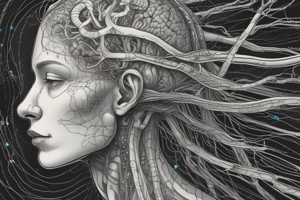Podcast
Questions and Answers
Which of the following tracts is part of the anterolateral pathways?
Which of the following tracts is part of the anterolateral pathways?
- Spinothalamic (correct)
- Vestibulospinal
- Dorsal column
- Corticospinal
Where is the neuronal cell body of the axons forming the spinothalamic tract located?
Where is the neuronal cell body of the axons forming the spinothalamic tract located?
- Thalamus
- Pons
- Spinal ganglion (correct)
- Cerebral cortex
Axons that form the spinothalamic tract enter the spinal cord through which root?
Axons that form the spinothalamic tract enter the spinal cord through which root?
- Lateral root
- Posterior root (correct)
- Medial root
- Anterior root
Axons from the posterior horn that do not synapse immediately can ascend or descend by how many spinal cord segments?
Axons from the posterior horn that do not synapse immediately can ascend or descend by how many spinal cord segments?
Which part of the brain is associated with the upper limb in the anterolateral pathways?
Which part of the brain is associated with the upper limb in the anterolateral pathways?
What color is used to represent the second-order neurons in the diagram?
What color is used to represent the second-order neurons in the diagram?
Where do second-order axons ascend to reach the third-order neuronal cell bodies?
Where do second-order axons ascend to reach the third-order neuronal cell bodies?
What is the target structure for the second-order axons in the spinoreticular tract?
What is the target structure for the second-order axons in the spinoreticular tract?
What function is primarily associated with the spinomesencephalic tract?
What function is primarily associated with the spinomesencephalic tract?
Through which structure do the axons from third-order neurons project to reach the primary somatosensory cortex?
Through which structure do the axons from third-order neurons project to reach the primary somatosensory cortex?
Where do neurons cross to join the anterolateral tract on the contralateral side?
Where do neurons cross to join the anterolateral tract on the contralateral side?
Study Notes
Anterolateral Pathways
- The anterolateral pathways consist of three tracts: spinothalamic, spinoreticular, and spinomesencephalic.
- The spinothalamic tract conveys separate aspects of pain.
Anterolateral pathways: Two courses
- Axons from the posterior horn take two courses:
- Some synapse immediately on second-order neurons in the posterior horn gray matter (lamina I and V).
- Others have axonal collaterals that ascend or descend one to two spinal cord segments in the posterolateral tract of Lissauer before synapsing with second-order neurons.
Neuronal Cells
- First-order neurons are colored light blue.
- Second-order neurons are colored purple.
- Third-order neurons are colored green.
Cerebral Hemisphere
- Structures in the cerebral hemisphere include:
- Sensory cortex (Upper limb)
- Internal capsule
- Thalamus
- Red nucleus
- Crus cerebri
- Middle cerebellar peduncle
- Fascicles of corticospinal fibers
- Pyramid
- Ventral white commissure
Pathways
- Pathways include:
- Sensory cortex (lower limb)
- Midbrain
- Pons
- Medulla
- Cervical cord
- Lumbar cord
Other
- The spinal lemniscus and spinothalamic tract are important structures.
Neurons
- Neurons cross obliquely over 2 to 3 spinal cord segments within the anterior commissure of the spinal cord to join the anterolateral tract on the contralateral side.
- Second-order axons ascend through the CNS to reach the third-order neuronal cell bodies in the ventral posterior lateral nucleus of the thalamus.
- Axons from third-order neurons project through the posterior limb of the internal capsule to reach the primary somatosensory cortex.
Tracts
- The spinoreticular and spinomesencephalic tracts have a similar beginning as the spinothalamic tract.
- The principal difference is the target structure of the second-order axons:
- The spinoreticular tract projects to the reticular formation in the brainstem to convey emotional and arousal aspects of pain.
- The spinomesencephalic tract projects to the periaqueductal gray matter and superior colliculi in the midbrain for central modulation of pain.
Studying That Suits You
Use AI to generate personalized quizzes and flashcards to suit your learning preferences.
Description
This quiz covers the anterolateral pathways, including the spinothalamic, spinoreticular, and spinomesencephalic tracts, and their roles in conveying pain and other sensory information.



